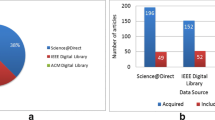Abstract
Blockchain has attracted much attention in recent years with the development of cryptocurrency and digital assets. As the underlying technology of cryptocurrency, blockchain has numerous benefits, such as decentralization, collective maintenance, tamper-resistance, traceability, and anonymity. The potential of the block-chain technology (BT) is widely recognized in the financial field. Although some scholars have proposed the combination of blockchain and supply chain finance (SCF), the details of this combination is rarely mentioned. This study first analyzes the coupling between SCF and blockchain technology. Second, the conceptual framework of block-chain-driven SCF platform (BcSCFP) is presented. Third, the operation process of three SCF models on the BcSCFP is proposed. Finally, a case study combined with actual events is conducted. This paper has a positive practical significance in the operation and management of banks and loan enterprises.
Similar content being viewed by others
References
Akins B W, Chapman J L, Gordon J M (2014). A whole new world: Income tax considerations of the Bitcoin economy. Pittsburgh Tax Review, 12: 25
Álvarez-Díaz N, Herrera-Joancomartí J, Caballero-Gil P (2017). Smart contracts based on blockchain for logistics management. In: Proceedings of the 1st International Conference on Internet of Things and Machine Learning. Liverpool: ACM, 73
Babich V, Hilary G (2019). Distributed ledgers and operations: What operations management researchers should know about blockchain technology. Georgetown McDonough School of Business Research Paper No. 3131250
Budin M, Eapen A T (1970). Cash generation in business operations: Some simulation models. Journal of Finance, 25(5): 1091–1107
Burkart M, Ellingsen T (2004). In-kind finance: A theory of trade credit. American Economic Review, 94(3): 569–590
Chod J (2017). Inventory, risk shifting, and trade credit. Management Science, 63(10): 3207–3225
Chod J, Trichakis N, Tsoukalas G, Aspegren H, Weber M (2019). On the financing benefits of supply chain transparency and blockchain adoption. Management Science. In press, doi: https://doi.org/10.1287/mnsc.2019.3434
Fabbri D, Menichini A M C (2016). The commitment problem of secured lending. Journal of Financial Economics, 120(3): 561–584
Foroglou G, Tsilidou A L (2015). Further applications of the blockchain. In: 12th Student Conference on Managerial Science and Technology. Athens
Haley C W, Higgins R C (1973). Inventory policy and trade credit financing. Management Science, 20(4-part-i): 464–471
Hofmann E, Strewe U M, Bosia N (2017). Supply Chain Finance and Blockchain Technology: The Case of Reverse Securitization. Berlin: Springer
Huang Y X, Liang Z H, Wang Y H, Lu G H (2018). Research on the application of blockchain in supply chain finance. Computer Science and Application, 8(1): 78–88 (in Chinese)
Li X Q, Jiang P, Chen T, Luo X P, Wen Q Y (2020). A survey on the security of blockchain systems. Future Generation Computer Systems, 107: 841–853
Li Z, Wang W M, Liu G, Liu L, He J, Huang G Q (2018). Toward open manufacturing: A cross-enterprises knowledge and services exchange framework based on blockchain and edge computing. Industrial Management & Data Systems, 118(1): 303–320
Lin I C, Liao T C (2017). A survey of blockchain security issues and challenges. International Journal of Network Security, 19(5): 653–659
Nakamoto S (2018). Bitcoin: A peer-to-peer electronic cash system. Available at: http://bitcoin.org/bitcoin.pdf
Noyes C (2016). BitAV: Fast anti-malware by distributed blockchain consensus and feedforward scanning. Cryptography and Security, Computer Science, Cornell University. Available at: http://arxiv.org/pdf/1601.01405.pdf
Peters G, Panayi E, Chapelle A (2015). Trends in cryptocurrencies and blockchain technologies: A monetary theory and regulation perspective. Journal of Financial Perspectives, 3(3)
Pun H, Swaminathan J M, Hou P (2018). Blockchain adoption for combating deceptive counterfeits. Kenan Institute of Private Enterprise Research Paper No. 18
Saberi S, Kouhizadeh M, Sarkis J, Shen L (2019). Blockchain technology and its relationships to sustainable supply chain management. International Journal of Production Research, 57(7): 2117–2135
Sharples M, Domingue J (2016). The blockchain and kudos: A distributed system for educational record, reputation and reward. In: European Conference on Technology Enhanced Learning. Adaptive and Adaptable Learning. Cham: Springer, 9891: 490–496
Tang C S, Yang S A, Wu J (2018). Sourcing from suppliers with financial constraints and performance risk. Manufacturing & Service Operations Management, 20(1): 70–84
Tian F (2016). An agri-food supply chain traceability system for China based on RFID & blockchain technology. In: 13th International Conference on Service Systems and Service Management (ICSSSM). Kunming: IEEE, 1–6
Wang S, Yuan Y, Wang X, Li J J, Qin R, Wang F Y (2018). An overview of smart contract: Architecture, applications, and future trends. In: IEEE Intelligent Vehicles Symposium (IV). Changshu, 108–113
Wuttke D A, Blome C, Henke M (2013). Focusing the financial flow of supply chains: An empirical investigation of financial supply chain management. International Journal of Production Economics, 145(2): 773–789
Zamani E, He Y, Phillips M (2018). On the security risks of the blockchain. Journal of Computer Information Systems, 1–12
Zhang Y, Wen J (2015). An IoT electric business model based on the protocol of Bitcoin. In: Proceedings of 18th International Conference on Intelligence in Next Generation Networks. Paris: IEEE, 184–191
Zheng Z B, Xie S A, Dai H N, Chen X P, Wang H M (2018). Blockchain challenges and opportunities: A survey. International Journal of Web and Grid Services, 14(4): 352–375
Author information
Authors and Affiliations
Corresponding author
Additional information
This research was supported by the National Natural Science Foundation of China (Grant Nos. 71932002 and 71571010), and Great Wall Scholar Training Program of Beijing Municipality (CIT&TCD20180305).
Rights and permissions
About this article
Cite this article
Li, J., Zhu, S., Zhang, W. et al. Blockchain-driven supply chain finance solution for small and medium enterprises. Front. Eng. Manag. 7, 500–511 (2020). https://doi.org/10.1007/s42524-020-0124-2
Received:
Accepted:
Published:
Issue Date:
DOI: https://doi.org/10.1007/s42524-020-0124-2




